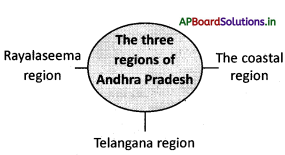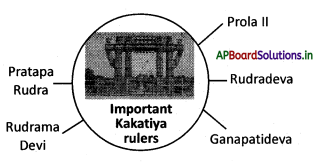Students can go through AP State Board 7th Class Social Studies Notes Chapter 12 The Kakatiyas – Emergence of the Regional Kingdom to understand and remember the concept easily.
AP State Board Syllabus 7th Class Social Studies Notes Chapter 12 The Kakatiyas – Emergence of the Regional Kingdom
→ Srimad-Andhra”Mahabharatam is the first poetic work in Telugu which was composed by Kavitrayamu, the Trinity of Poets – Nannaya, Tikkanen, and Erra Pragada between 1000 and 1400 AD.
→ Vaidyanathan wrote PrathaparUdra Yashobhushanam during the Kakatiya rule.
→ Kakatiya inscriptions are in Telugu and they called themselves ‘Andhra Rajas’.
→ During Rudradeva’s rule, the capital was shifted from Anmakonda to Orugallu.
→ Rudradeva built a big fort, a tank, and a temple called Thousand Pillared Temple in Anaconda.
→ The city buildings and palaces were within this stone wall.
→ The city itself was divided into several quarters or Vadas.
→ Rudramadevi ruled from Orugallu and belonged to the famous Kakatiya family. She ruled from 1262 AD to 1289 AD for nearly 27 years.
→ Marco Polo visited Rudramadevi’s kingdom.
![]()
→ The Kakatiyas brought large tracts of land under cultivation by building tanks and digging wells.
→ The Kakatiyas also extensively patronized temples by donating to them.
→ Sometime around 1190 AD, a new kingdom was established in Delhi. The new kings were called Sultans and they originally came from Turkistan.
→ Sultan Mohammad binTugluq was able to defeat Kakatiya Prataparudra in 1323 AD.
→ Palani Virula Katha written by Srinatha.
→ Warriors: Brave or experienced soldiers or fighters
→ Nayantara System: Nayakaras (the authority of several villages) depended upon the queen or the king and remained loyal to them. They were also probably used to subdue the rebellious chiefs. This arrangement was called the Nayankara system.
→ Samantha: The landlord or warrior chief of seventh century A.D.
→ Artisans: Skilled workers who make things by hand.
→ Turkistan: A kingdom in Europe.
→ Abhaya Sasana: A pillar inscription issued by the Kakatiya king.
![]()
→ Marco Polo: An Italian traveler.
→ Fort: A building constructed to defend a place against attack

